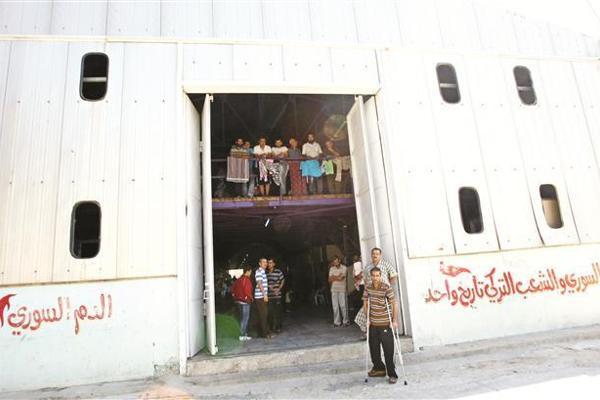West, Turkey split over aid for Syrians
ISTANBUL- Hürriyet Daily News


Syrian refugees stand on a balcony as they wait for the International peace envoy for Syria to arrive in the Altınözü camp. AFP photo
Having refused international assistance when fleeing Syrians began to arrive in Turkey a year and a half ago, the Turkish government is now having a hard time convincing members of the international community to help with the ever-growing problem, while the intensity of the influx is on the verge of exceeding Turkey’s capacity to accommodate the refugees.Turkey’s request for cash assistance and the level of its cooperation with the United Nations Refugee Agency (UNHCR), which is considered to be limited by third parties, are seen as major reasons for the unwillingness of the international community to help, according to Western diplomatic sources.
“We are being asked to write a check for Turkish government. But things do not work like that. We prefer to extend assistance through U.N. bodies,” a European official told Hürriyet Daily News.
“We are cooperating with UNHCR, but we obviously will not allow the camps be under the control of UNHCR. We will not give up our sovereign rights. And to our knowledge UNHCR is fully satisfied and very pleased with our cooperation,” said a Turkish official familiar with the issue, adding that those third parties that are unwilling to put their hands in their pockets are hiding behind “baseless” arguments.
The same official pointed out that the U.N. refugee agency’s call for assistance for Syrian refugees has also met with a limited response. The UNHCR has devised two plans to tackle the problem, one designed to be implemented within Syria and the other to assist neighboring countries, and urged member countriesv to fund these plans. Only $104 million of the $193 million regional appeal and $94 million of the $180 million dollar appeal for the plan targeting populations within Syria has been provided. Turkey alone has so far spent almost twice as much as the amount of funds provided by the international community to both plans combined, with Foreign Minister Ahmet Davutoğlu recently citing a figure of more than $300 million spent to date.
It seems Turkey is suffering from its initial decision to avoid appealing to international solidarity and seeking burden-sharing assistance right from the beginning, when the first Syrians began to arrive in April 2010, as the waves of the Arab awakening reached Syria.
FM’s disappointment
At the time the Turkish authorities stated that they were able to cope with the influx and did not for the time being need international support. Davutoğlu’s disappointment, however, at the weak response of the international community once Turkey decided to ask for assistance was clear from the speech he delivered during the UN’s Syria meeting last August. “There is an increasing sense in Turkey that through making such a sacrifice and tackling an enormous issue all by itself, we are leading the international community to complacency and inaction,” he said.
Last April, Turkey informed the UNHCR that it would accept burden-sharing proposals from the international community. First and foremost, cash assistance is required, Turkey officially told the UNHCR. For in-kind assistance, Turkey has provided a list of goods it will accept and established international assistance reception centers are at the Adana airport and the port of Mersin.
Cooperation with NGOs
Recently, Turkey began to focus on the steps that need to be taken within Syria’s borders. This month it began delivery of humanitarian aid at the zero point of the border, and established Relief Reception Centers in Kilis, Gaziantep and Hatay for this purpose.
Meanwhile, Western sources claim increased cooperation with the UNHCR as well as international nongovernmental organizations (NGO) will contribute to Turkey’s quest for more assistance, since it will give legitimacy to the camps, which have been a source of controversy between the government and opposition parties, which claimed they were being used to provide military training to the Syrian opposition. Turkey has refused to accept assistance from dozens of NGOs, claiming this would create a security and order problem. “We do not want to make any exception for any NGO because once we open the doors to one, we’ll end up having more than 100 NGOs asking to come,” a Turkish official told the Daily News.
